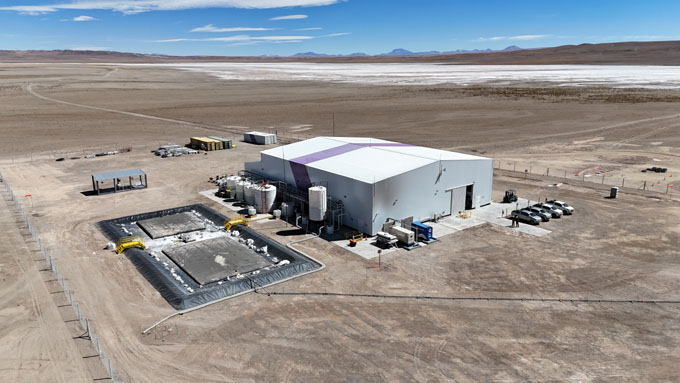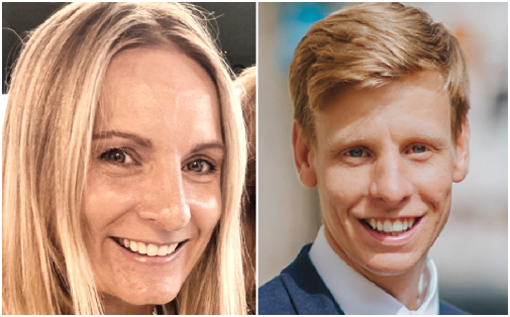
Zoe Suren, Founder and Managing Director at EnergiLink, a search firm specialising in providing upstream technical and commercial skillsets in to E&P and alternative energies, in conversation with Thomas Goode, Exploration Director at Lilac Solutions.
Thomas Goode, Exploration Director at Lilac Solutions, a leading lithium extraction company, has been instrumental in drilling 19 lithium brine wells, uncovering over 10Mt LCE and spearheading entries into two countries.
KeyFacts Energy are delighted to announce the launch of our "Inspirational Careers Insights" series. In collaboration with EnergiLink, a leading search firm specializing in placing technical and commercial professionals within the Oil & Gas sector while facilitating transitions to alternative energies, Keyfacts Energy will be conducting interviews with industry experts to gain valuable insights into their career journeys. Our goal is to inspire emerging professionals and provide guidance on the diverse career paths available within the sector.
For our inaugural article, we are thrilled to feature an interview with Thomas Goode, a seasoned Geologist who spent a decade in the Oil & Gas industry before transitioning to lead a multidisciplinary technical team at a prominent Lithium extraction company.
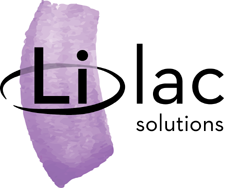
It’s a pivotal time for the lithium industry. As China achieves unparalleled economies of scale across the electric vehicle supply chain, U.S. and European companies are working to adopt new technologies to reduce costs and build diversified supply chains. For lithium producers, this means adopting new technology to unlock brine resources with lower costs and at new sites closer to home.
Lilac Solutions focuses on revolutionising lithium extraction, enhancing sustainability and efficiency in the energy sector.
Inspirational Career Insights:
Thomas, could you elaborate on your current role as Exploration Director at Lilac Solutions?
I lead a team of multidisciplinary technical experts, based in London. The group’s expertise spans geology, geophysics, petrophysics, drilling and reservoir engineering, alongside project management.
Our remit is to find new lithium brine resources within OECD countries where we can deploy Direct Lithium Extraction (DLE) Technology to develop previously undevelopable resources.
This involves building our understanding of the lithium system via R&D projects, basin screening and evaluation, laboratory experiments covering reservoir quality and source rock geochemistry, play fairway mapping and the 3D modelling of brine deposits.
We collaborate with our engineering teams in Oakland, USA to provide them with production profiles for different lithium brine development scenarios. This enables them to tailor their DLE technology and plant design to the specific brine chemistry and reservoir performance to account for grade dilution through plant life.
What are the business's aspirations for growth and development in the upcoming years?
Lilac Solutions is looking to increase sales of its DLE Technology to different brine markets around the globe, targeting growth in geothermal, salar and oilfield brine markets. The company is also pushing towards its first commercial project at the Great Salt Lake in Utah.
The Resource Division is looking to continue to build its resource base following three successful years of drilling within the Lithium Triangle, whilst identifying strategic partners to progress its exploration assets in Europe.
Starting your Geoscience journey with voluntary work in 2011, can you walk us through your career progression within the E&P sector?
I spent just under ten years in the oil and gas sector, working in exploration, appraisal, development and operational roles for a variety of operators. This enabled me to work on projects in the UK, Norway, Central and West Africa, Brazil and India.
To begin with, I wasn’t even sure that I wanted to move into the oil industry, hence the lack of a Petroleum specific master’s degree. But as I completed a research project up in Svalbard focused on a Barent’s Sea reservoir, the idea started to crystallise.
I was fortunate enough that my neighbour was working at a local VSP manufacturing factory, so it wasn’t long before I joined him on the shop floor to see how the tools were made. Given how local it was, I would just hang around onsite as the group tested out their latest kit in a nearby well, making cups of tea for those on site. This was my first taste of the importance of networking, especially in our industry.
My first full time role was with IGas Energy, who operated numerous oilfields across the UK. Given that the fields were a short drive or a train journey away from the offices it provided me with valuable hands-on experience. Here I provided the geological inputs for recompletions, reperforations, pump installations, acid washes and it wasn’t long before we were drilling new injection and production wells.
This all culminated in being the project geologist for the first shale gas wells to be drilled in a basin called the Gainsborough Trough. Here, we discovered a large gas resource in the UK that is unlikely to ever be developed due to the substantially public headwinds that oil projects now face within Europe.
After six years operationally intensive year at IGas, I was able to take the next step with a private equity backed group called Delonex Energy, where four discoveries had been made after six wells and >2000 sq km of newly acquired 3D seismic had just arrived in-house.
That was an awesome experience working up a basin with a top team of people as we looked to surpass the threshold volume required for a pipeline to be constructed to the basin in Northern Chad.
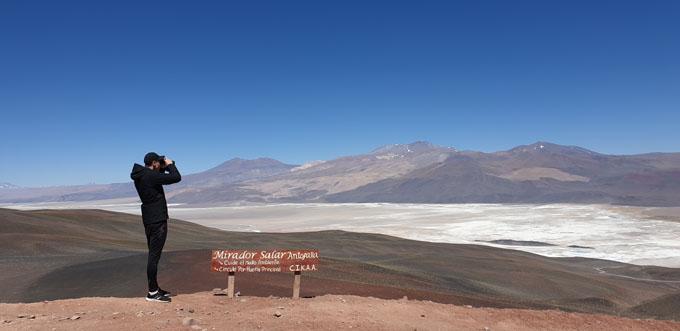
Unfortunately, Covid-19 had different ideas and before we could spud the next set of wells, Delonex was forced to shut up shop. This meant that me and the group were out in the cold, looking for a job in the middle of lockdown and with the oil price in the toilet. Like for most people during Covid-19, this was a tough time. But once again, the network came through for me.
The next opportunity was a Development focused role with an astute operator called Trident Energy. It is a great team of people, and they have fantastic mid to late life assets, with excellent datasets that you can really get your teeth stuck into. This involved interpreting 3D and 4D seismic to construct models of turbidite reservoirs, analysing BD opportunities along the West African seaboard whilst trying to figure out reservoir connectivity in complex Brazilian carbonate reservoirs. But the absolute highlight was working out in Equatorial Guinea (EG) as we delivered a complex three well drilling programme, capped off by the experience of playing and training with a top division EG football team – to the local’s delight!
Despite not having the big names on my CV, I was fortunate to be involved with the drilling of many different wells in many different basins. This is really where you test your ideas as a geologist and understand the uncertainties around your interpretations and it was that grounding that gave me the foundation to apply these learnings to the lithium brine industry.
Many professionals in the Subsurface field aim to explore diverse industries. How did you navigate this transition?
My transition into the lithium industry was bought about by the necessity of the Covid-19 pandemic. I knew that I wanted to stay in technical, geologically focused roles, but getting another job in the oil industry at that time was proving to be a difficult nut to crack. In the end, Trident gave me this opportunity, but despite that, I knew that I needed to adapt if my career was going to survive in the long term.
This pushed me to research different areas where our O&G skills sets are applicable, and anyone who works in the industry excels when it comes to solving problems around fluid flow in porous media.
Once I found the industries that were tackling this problem, with potentially the wrong background (i.e. hard rock miners trying to unpick brine based mineral mining), I knew that it was time to pick up the phone again and leverage the network I had nurtured.
Luckily my previous manager had just finished up an MBA at Stanford and he had recently joined a DLE technology start up based in the Bay Area. That team knew a lot about DLE but nothing about the resources where the fledgling tech needed to be deployed.
Additionally, my old boss and I had seen the impact that new technology can have on unlocking new and overlooked resources after our time working unconventionals where horizontal drilling and fracking had completely changed the game in the USA.
Eyeing up that opportunity we set out to understand the geology that leads to the enrichment of lithium brines.
How did your expertise in subsurface exploration contribute to your work in lithium extraction?
It didn’t take long to figure out that the play components that are needed to build an active petroleum system aren’t too dissimilar to those required to have an enriched lithium brine.
So, it became a case of adapting well-trodden O&G workflows and applying them to the hunt for lithium brines. You still need to research and collate large geochemical and reservoir quality data sets, map out key parameters and combine this knowledge into a geocellular model. You need to plan and design injection and production wells and simulate the results to understand dilution, just like you need to predict oil production rates and water breakthrough.
You need to work with topside engineers to plan and design well heads, pipelines, gathering centres and plants. Instead, this time, you are cycling around extremely salty water instead of gas, oil and water!
In London we are blessed with a depth of talent across all the disciplines that bring oil projects to life. Those professionals are experts in fluid flow in porous media and that is the same skill set required, with adaptations, to the lithium brine industry.
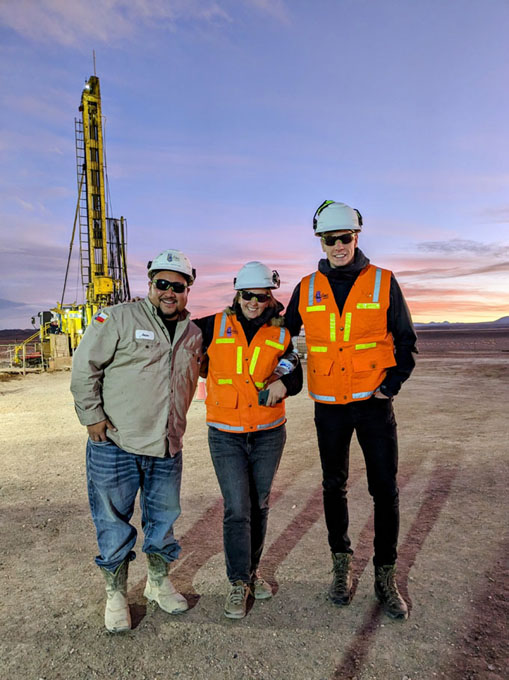
In transitioning your career path, what key skills did you find most valuable?
Firstly, I think that I needed to be open minded and curious. Almost five years ago I knew nothing about lithium, now, at Lilac Solutions, we can hold our own having discovered a top 10 global resource.
But that opportunity, like so many others in my career, wouldn’t have been accessible if it wasn’t for the network I had fostered. We are all fortunate that we work with a lot of intelligent scientists.
Sometimes the work environment, particularly during operations or a downturn in the cyclical oil price, can put stain on those interactions. Maintaining those relationships as best as you can is important, even if you can’t do it successfully all the time, because it inevitably opens doors down the line.
What advice would you offer to individuals looking to make a similar career shift?
The lithium industry is still a nascent industry. It doesn’t come without risk. Much like working at any other start up, and like any start up, the pace and the element of unpredictability doesn’t suit everyone.
Unfortunately, there aren’t a huge variety of operators yet within the UK that are focused on lithium brines. Those that are present are start-ups and based outside of London. So, if you want to make that change, I think you need to be adaptable. Prepared to move, prepared to take the risk to move into a start-up, and prepared to balance the idea of moving back into the O&G industry if it doesn’t work out.
As you continue to advance professionally, are there specific skills or areas you plan to focus on to enhance your expertise?
Being in a start-up, the exposure to different businesses areas can be extreme. From finding offices, setting up computers, building budgets, hiring teams, setting up the right lawyers and accountants, driving new country entries, managing foreign political stakeholders, driving technical work and even pitching to VCs. You seem to have to cover everything. This means that me and the rest of the group have grown a lot outside of just geology. Personally, I am happy to keep riding this wave and learning on the way. Because every day it’s a new problem to solve and we all grow by the day.
When building your own team, what are the critical skills and qualities you prioritize in potential hires?
We wanted to create a well-rounded team. Different skill sets and different backgrounds. They certainly needed to have a positive, can-do attitude and be prepared to get stuck in and deal with the fast-paced environment.
Of course they needed to be technically very good, but we have a lot of people like that in London due to the great universities and the ranges of operators in town. So really, the most important factor was that they all needed to get on.
Being such a small office, and with constant drilling activities, it was integral that we had a group of people who were able to challenge each other to improve our business, whilst always maintaining morale within the team.
Thank you to Zoe Suren. Founder and Managing Director at EnergiLink and Thomas Goode, Exploration Director at Lilac Solutions, for this 'Inspirational Career Insights' Q&A
KeyFacts Energy Industry Directory: Lilac Solution l EnergiLink l KeyFacts Energy: Q&A
 KEYFACT Energy
KEYFACT Energy
